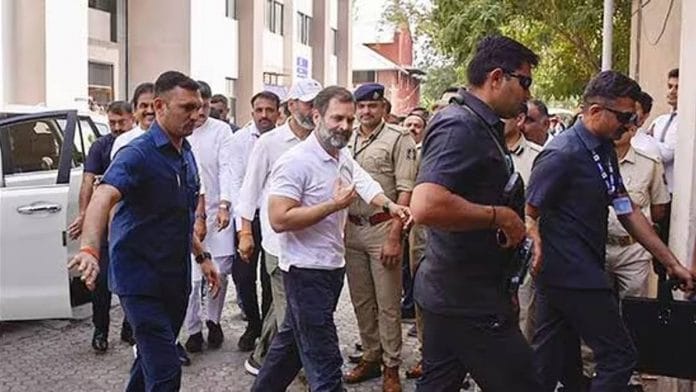New Delhi: Referring to Rahul Gandhi as a “habitual offender”, Gujarat BJP MLA Purnesh Modi has opposed the Congress leader’s plea to suspend his conviction in a 2019 defamation case. Gandhi was sentenced to two years’ imprisonment on 23 March, and was disqualified as a Lok Sabha MP the next day.
Modi, who was the complainant in the defamation case, even took objection to the way Gandhi was present with Congress leaders before the magistrate when he read out the judgment last month, as well as for allegedly pressuring the court by attending it along with his party members the day (3 April) he filed his appeal.
In his response filed before a sessions court in Gujarat’s Surat Tuesday, which is seized of Gandhi’s appeal against his conviction, Modi said that with “more than 10 criminal defamation cases pending” against him, Gandhi “is in the habit of making such irresponsible and defamatory statements which would either defame others or hurt someone’s sentiments, in the name of freedom of speech and political criticism and dissent”. Hence, no leniency should be shown to him, Modi argued.
The court is likely to take up the case for hearing Thursday.
Also Read: Who are Modis? Community ‘defamed’ by Rahul has nomadic origins, came to Gujarat 600 years ago
‘Extraordinary arrogance’
It was on the BJP leader’s complaint that a Surat chief judicial magistrate’s court on 23 March held Gandhi guilty for making defamatory comments about the ‘Modi’ surname at an election rally in Kolar, Karnataka, in 2019.
Modi had claimed in his complaint that Gandhi’s statement — “Nirav Modi, Lalit Modi, (Prime Minister) Narendra Modi. How come all thieves have ‘Modi’ as a common surname” — had defamed the entire Modi community.
Modi’s reply also spoke about the legal position related to defamation law and asserted that the cardinal principle allows a court to suspend a conviction only in rare cases and under exceptional circumstances. However, in Gandhi’s case “none of the two can be made out”, he stated to the court.
He further accused Gandhi of making “unfair and contemptuous remarks”, through “his aides, associates, leaders of his party and others”, against the court.
Gandhi, he added, was “guilty of interference” in court proceedings and the process of law. He raised objection to the manner in which Gandhi along with Congress leaders presented themselves “in large numbers” before the Surat court the day the judgment was pronounced.
The announcement to attend the court on that day was given wide publicity in print and other media, Modi said, claiming Gandhi also derived political mileage out of a statutory requirement to file an appeal.
Modi said even at the time of filing the appeal, the Congress leader showed “extraordinary arrogance and a very conscious attempt to over-awe and bring pressure on the competent court”.
He claimed that at the time of the filing of the appeal, “the convict’s personal presence is not required. But Gandhi and several party leaders — state as well as national-level — came in a rally to file the appeal”.
Filing of appeal is a statutory process, it cannot be abused ether to take political mileage or bring pressure on the court. In view of Gandhi’s “arrogant conduct”, Modi asked the sessions court to dismiss his appeal as well.
Gandhi guilty beyond ‘reasonable doubt’
To Gandhi’s argument that his conviction and two-year sentence had led to his disqualification as a parliamentarian, which is undesirable, Modi said that the right to represent the public in Parliament is not a constitutional right.
A lawmaker, he argued, is on par with any ordinary citizen and neither a parliamentarian nor a legislator can claim any “special privilege”. On the contrary, he maintained, a public representative, such as Gandhi, is expected to be more careful.
Moreover, the right to apply suspension of the sentence “is at the best based on the judicial discretion of the court within the four corners of the statute only”, Modi argued.
This right does not have force of mandate, but is merely a statutorily provided discretionary right present with the court. Therefore, Gandhi cannot claim right to suspension of conviction as a right of enforceability, Modi has submitted in his response.
The BJP leader called the magistrate court’s order “a well-reasoned judgement, just, legal and proper”, which was delivered after sufficient evidence was led on record. The evidence was both oral and in the nature of electronic evidence. Hence, Gandhi’s conviction cannot be faulted, he said, since it is based on legally admitted evidence that proved his guilt beyond “reasonable doubt”.
Gandhi, Modi further pointed out, has admitted to the defamatory speech. Despite the trial court holding him guilty, Gandhi has justified his speech in public, said Modi, adding that the Congress leader also said that “his speech had been given in public interest”.
(Edited by Nida Fatima Siddiqui)






